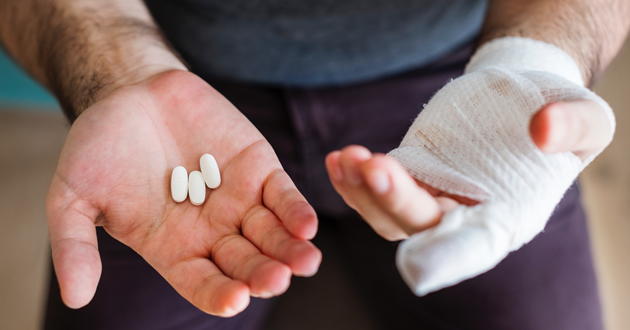Prescription Opioid Rehab Treatment
 Prescription opioids are often prescribed to help people find relief from moderate to severe pain, including injuries, surgeries and painful chronic conditions. This class of drugs are either derived directly from the poppy plant, or chemically structured by scientists. Prescription painkillers provide a feeling of relaxation and a euphoric “high,” which contributes to the reason it is often misused. According to the National Institute on Drug Abuse (NIDA), between 26.4 million and 36 million people abuse opioids worldwide.
Prescription opioids are often prescribed to help people find relief from moderate to severe pain, including injuries, surgeries and painful chronic conditions. This class of drugs are either derived directly from the poppy plant, or chemically structured by scientists. Prescription painkillers provide a feeling of relaxation and a euphoric “high,” which contributes to the reason it is often misused. According to the National Institute on Drug Abuse (NIDA), between 26.4 million and 36 million people abuse opioids worldwide.
Similar to heroin, a street drug derived from similar compounds, prescription opioids also pose high risk for addiction, overdose and death. The most commonly abused prescription painkillers include the following:
-
oxycodone (OxyContin, Percocet)
-
hydrocodone (Vicodin, Lortab, Norco)
-
hydromorphone (Dilaudid)
-
fentanyl (Duragesic)
-
codeine
-
morphine
Scientifically speaking, opioids bind to receptors in the brain and cause its reward centers to release dopamine, a hormone associated to feelings of pleasure. Once the body adapts to opioid medication, the person becomes dependent and increasingly more tolerant of the drug to the point that skipping a dose or not receiving enough induces unbearable negative physiological and psychological symptoms. Thus, creating a perpetual desire to use the drug repeatedly. It is for this reason that treatment for prescription opioid addiction becomes a long and arduous battle, both for those in addiction and their families. However, with the help of addiction professionals, therapy, and various other methods, breaking free from this chronic medical issue is possible.
Signs of Prescription Opioid Addiction
If you take your prescription medication as directed, you are less likely to run into problems. Nonetheless, we’re all unique and some people do become addicted. If you suspect that you or your loved one may have gotten hooked on prescription opioids, there are common warning signs that can help you determine if the line between appropriate medical use and substance abuse has been crossed.
Behavioral Signs of Opioid Addiction
One of the most important markers of a prescription opioid addiction are behavioral changes. Do you get angry when friends and family question you about your prescription? More importantly, are you lying about how your taking the medication? Some addicts navigate around the regulations that help avoid prescription drug addiction by visiting multiple doctors to acquire more prescriptions, also referred to as “doctor shopping.” Generally, when the person’s desire to obtain the drug trumps their values and cause them to set aside the fact that their actions could hurt the people they care about, it is a good indication of addiction.
Physical Signs of Opioid Addiction
Prescription opioids are depressants or “downers” that can slow breathing rate, reaction times and movements. Someone who may be abusing the drug could show restricted pupils, slurred speech, and flushed skin. Another commonly reported side effect of taking prescription painkillers is constipation, which may lead the user to regularly turn to laxative use for relief.
Psychological Signs of Opioid Addiction
Addiction is a disease of the mind, making psychological symptoms of opioid addiction another important point to observe. The person may show signs of depression, anxiety, mood swings, or even a distorted perception of reality.
Prescription Opioid Withdrawals
There are multiple factors that can determine a person’s opioid withdrawal symptoms, including frequency, length of time and amount of drug use. This explains why everyone has a different experience after quitting.
Prescription withdrawal symptoms gradually progress overtime. Within the first day of stopping opioid intake, you may experience the following:
-
Runny nose
-
Difficulty sleeping
-
Abnormal sweating
-
Muscle aches
-
Watery eyes
-
Feeling anxious
After the first day, the body exhibits a more intense yearning for prescription opioids that translate to more difficult symptoms, including:
-
Stomach cramps
-
Diarrhea
-
High blood pressure
-
Nausea
-
Vomiting
-
Increased heart rate
-
Dilated pupils and vision changes
Your symptoms last could last longer or shorter based on the severity of addiction as well as unique factors such as your overall physical health.
Risks of Quitting Prescription Opioids Cold Turkey
An at-home detox can be a very uncomfortable process that come with the risk of life threatening complications. The painful side effects of opioid withdrawals can easily thwart anyone’s willpower to quit, thus leading to high relapse rates. With professional detox, the addict can wean off the opioids humanely and increase one’s chance of sustaining sobriety.
Treatment Options
Treating prescription opioid addiction typically begins with medical detox, followed by subsequent other treatments that aim to help the addict maintain and build on the progress they’ve made.
Medical Detox
Medications used to assist with prescription opioid recovery include:
-
Buprenorphine
This partial opioid agonist acts like an opiate but does not have the addictive euphoric effects of opioids. It is often combined with naloxone, an emergency narcotic overdose medication, which further lowers buprenorphine’s potential for abuse. Buprenorphine is available on an outpatient basis.
-
Naltrexone
Naltrexone works by blocking opioids from having any effect, instead of imitating it. It’s typically used to reverse overdose, but is sometimes used to assist recovering addicts in maintaining their sobriety.
-
Methadone
During medical detox, methadone may be used to reduce the symptoms of withdrawal. It imitates the effects of prescription opioids, but is highly controlled and can only be administered in licensed methadone clinics. Methadone itself is addictive, which is why strict medication management must be exercised to avoid any potential for abuse.
Residential Treatment for Prescription Opioid Addiction
In an inpatient treatment program, the addict will be immersed in a controlled environment while recovering from his or her substance dependence. Inpatient treatment is often the most ideal setting for someone suffering from severe prescription opioid addiction. The round-the-clock support from addiction specialists means recovery can happen as comfortably and safely as possible. Inpatient rehab typically involve daily group therapy, individual counseling, and mental health appointments if needed. Residential treatment for prescription opioid addiction can last anywhere between six months to a year, followed by outpatient treatment.
Outpatient Treatment for Prescription Opioid Addiction
Outpatient programs allow an individual to maintain their daily personal or work obligations while working on their recovery from substance addiction. For someone recovering from prescription opioid addiction, outpatient treatment is typically recommended at the end of inpatient treatment as a way to transition back into an environment without the close supervision of rehab professionals.
If treatment in a residential setting isn’t feasible, outpatient programs can help ensure that addiction professionals are involved in the recovery journey. However, it’s important to bear in mind that outpatient programs require that the person has a stable and supportive home environment, as this type of rehabilitation tends to have a higher relapse rate.
Prescription Opioid Recovery
Recovering your life from prescription opioid addiction is a life changing feat that doesn’t have to be suffered through alone. The addiction itself will inflict pain in yours or your loved one’s body until it receives the drug it has gotten accustomed to receiving, thus perpetuating a cycle that’s difficult—and dangerous—even for the strongest-willed person to intercept.
Addiction recovery is a process that takes time. With a team of experts who’ve helped dozens of others get to a place where they’re able to live life without using substances, you too can heal. Once you develop the tools you need to cope through day-to-day living, and forge new hobbies and relationships, you’ll be able to create a path to new memories and a more fulfilling sober life without prescription opioids.










